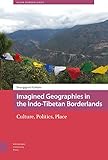Imagined geographies in the Indo-Tibetan borderlands : culture, politics, place / Swargajyoti Gohain.
Material type: TextSeries: Publication details: Amsterdam : Amsterdam University Press, (c)2020.Description: 1 online resourceContent type:
TextSeries: Publication details: Amsterdam : Amsterdam University Press, (c)2020.Description: 1 online resourceContent type: - text
- computer
- online resource
- 9789048541881
- 9048541883
- DS432 .I434 2020
- COPYRIGHT NOT covered - Click this link to request copyright permission: https://lib.ciu.edu/copyright-request-form
| Item type | Current library | Collection | Call number | URL | Status | Date due | Barcode | |
|---|---|---|---|---|---|---|---|---|
 Online Book (LOGIN USING YOUR MY CIU LOGIN AND PASSWORD)
Online Book (LOGIN USING YOUR MY CIU LOGIN AND PASSWORD)
|
G. Allen Fleece Library ONLINE | Non-fiction | DS432.63 (Browse shelf(Opens below)) | Link to resource | Available | on1164698285 |
Includes bibliographies and index.
This book is an ethnography of culture and politics in Monyul, a Tibetan Buddhist cultural region in west Arunachal Pradesh, Northeast India. For nearly three centuries, Monyul was part of the Tibetan state, and the Monpas, as the communities inhabiting this region are collectively known, participated in trans-Himalayan trade and pilgrimage. Following the colonial demarcation of the Indo-Tibetan boundary in 1914, the fall of the Tibetan state in 1951, and the India-China boundary war in 1962, Monyul was gradually integrated into India and the Monpas became one of the Scheduled Tribes of India. In 2003, the Monpas began a demand for autonomy, under the leadership of Tsona Gontse Rinpoche. This book examines the narratives and politics of the autonomy movement regarding language, place-names, and trans-border kinship, against the backdrop of the India-China border dispute. It explores how the Monpas negotiate multiple identities to imagine new forms of community that transcend regional and national borders.
COPYRIGHT NOT covered - Click this link to request copyright permission:
There are no comments on this title.
